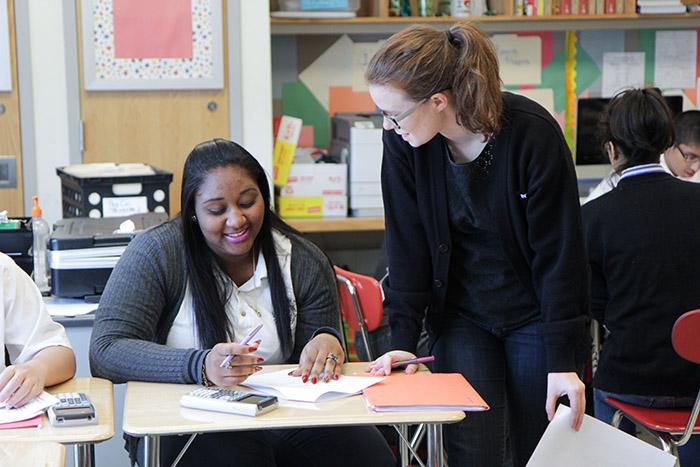Growth Industry

As a Blue Engine Teaching Assistant, Bernadette Brandt '13 (right) works with students in a New York City high school. Photo courtesy of Bernadette Brandt ’13.
Bernadette Brandt ’13 discovers the rewards of helping young minds grow
Bernadette Brandt ’13 keeps pretty busy. The policy management major studied abroad for a semester in Malaga, Spain; spent a semester at Dickinson's Washington Center in D.C. her junior year; and started with AmeriCorps’ Blue Engine as a BETA (Blue Engine Teaching Assistant) in August 2013.
A month from now, she’ll begin her stint in another AmeriCorps program called FoodCorps in Connecticut, where she’ll create and maintain school gardens, integrating nutrition education into high-school classrooms and working with farmers to source healthy local food into school lunches.
What does your current job entail, and what about it interests you most?
Every day, I lead my small group of high-school students toward success in geometry. That entails so many moving parts—everything from prepping my lesson to behavior management, grading, parent phone calls and building relationships with my students. It’s difficult to articulate everything that happens in the average day of a teacher.
How did you get interested in Blue Engine?
As a policy management major, I knew that it made sense for me to have a grounding in what happens in the classroom to fully understand the system before moving to the policy realm. Beyond that, many things about the organization’s model stuck out to me as impressive, such as their commitment to using data effectively, their policy of earning the right to do this work and their efforts to make their work sustainable in the long term.
Blue Engine also fosters a workplace culture in which BETAs care about each other as people and respect and celebrate our differences. My team made this year a better and more positive one for me, and for that I am truly grateful.
Can you speak to how your Dickinson experience prepared you for what you’re doing now?
So much of the daily success in the classroom is brought about by my team. At Dickinson, I was able to work in leadership roles in clubs and campus jobs that gave me skills in listening, collaborating and leading a team.
I also walked away with the ability to think critically, analyze situations and ask the right questions to move forward. As a first-year teacher, I encountered a steep learning curve and had to reflect daily on my work, identify areas for improvement and find solutions for the next day. If I had not learned and developed the ability to be a team player and a leader, this year would not have been as seamless as it was.
What do you love most about what you do?
The obvious answer is that I love my students and the full-grown people they are becoming. With teenagers, every day is a new opportunity to try out something new and figure out the person they want to grow into. Over the course of the year, I have seen so much growth in my students—not just in geometry but also in their self-control, their persistence and their motivation. As I wrap up this year, I leave with excitement. I cannot wait to see the amazing young adults that will walk across the stage in two years to pick up their hard-earned diplomas.
What was your favorite activity/organization at Dickinson?
There are so many wonderful experiences to choose from, but one of my most formative experiences at Dickinson would have to be with Alternative Spring Break. For two years, I traveled to the Tohono O'odham Nation in Arizona, first as a participant and then as a team leader. The amazing people that worked alongside me taught me so much and left me with lasting friendships. However, the biggest lesson I learned was about service work and the humility and perspective that should be brought to it. These lessons inform my actions every day when I step into the classroom.
What jumps out as a great memory from your time at Dickinson?
When I was studying off-campus in D.C., I received an invitation to the White House to hear President Obama talk. After background checks, security lines and the like, I made it inside. We were shepherded into a room, and soon the president arrived and gave a speech on student college debt. It was cool to visit the White House and hear the president speak.
Another great experience was a field trip to the College Farm with [Assistant Professor of History] Emily Pawley’s class Food and the Environment. We were treated to a livestock tour, learning about the chickens, goats and cows. We also planted, weeded and helped with other farm chores before cooking lunch on the farm. The day was beautiful, and I learned from doing, rather than reading about it.
Learn more
- Brandt's senior seminar tackled Carlisle's role in the Civil War: "Leaving Books for Battlefields"
- Estiven Rodriguez '18 was once a Blue Engine student: "When the President Talks About You in a Speech"
- Alumni in Action
- Latest News
Published July 16, 2014